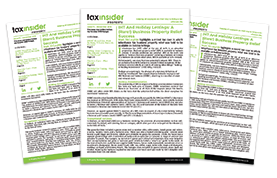Before you go, sign up to our free tax saving email course. Get 7 top property tax saving strategies in your email inbox that will help you save thousands in tax. Unsubscribe any time.
 Mark McLaughlin highlights a case where the taxpayer was accused of making a careless error despite seeking HMRC’s advice. Mark McLaughlin highlights a case where the taxpayer was accused of making a careless error despite seeking HMRC’s advice.Taxpayers such as buy-to-let landlords often seek advice from HM Revenue and Customs (HMRC). This is generally sensible, particularly if the taxpayer does not have a professional adviser. However, things can sometimes go wrong and caution is needed. Misunderstandings can easily arise. Pre-letting expenses For example, in Negka v Revenue and Customs [2019] UKFTT 0082 (TC), the taxpayer bought a residential property on 12 July 2013. She lived there until 16 June 2014. The property was then rented out until 23 May 2015. It was sold on 16 June 2015. The taxpayer claimed expenses of £19,772 incurred in preparing the property to rent against rental income in her tax return for 2013/14 (which resulted in a loss carried forward to 2014/15). HMRC disallowed the expenses as the taxpayer was living in the property when the expenses were incurred. HMRC’s discovery assessments in October 2017 were made on the basis that the taxpayer’s incorrect expenses claim was careless (TMA 1970, s 29(4)). The taxpayer appealed. Forgot to mention… The taxpayer had called HMRC regularly for assistance with tax queries. She explained to the First-tier Tribunal that she had spoken to two technicians at HMRC about the expenses claim: ‘they both told me that I can either claim them in the year that they took place or I can claim them in the year I started renting the property as these repairs were made with the view to rent my house’. However, the taxpayer had failed to mention that she was still living in the property when the expenses (on repairs and renewals) were being incurred. This invalidated the taxpayer’s claim for pre-letting expenses, as they were not ‘wholly and exclusively’ incurred for the purposes of her rental property business. The taxpayer admitted at the tribunal hearing that she had made a mistake but denied that she failed to take reasonable care. A lucky escape? The tribunal noted: (1) The taxpayer called and wrote to HMRC to advise she was living at the property between 12 July 2013 and 16 June 2014; (2) She chose to call HMRC for advice repeatedly, as she was unsure about claiming expenses before a tenant had moved in and wanted to be sure her claim was correct; (3) The transcripts of the calls demonstrated that she was told she could claim the rental expenses if the property was available to rent. The tribunal concluded that the taxpayer took the steps of a ‘prudent and reasonable taxpayer’, and that HMRC had been unable to establish that she had failed to take reasonable care. The taxpayer’s appeal was allowed. Nice try! Where a taxpayer does not have a tax adviser, HMRC sometimes tries to argue (as in Negka) that the taxpayer has not taken reasonable care on the basis that a prudent taxpayer would have appointed an adviser to prevent the tax return error being made. However, there is no statutory requirement for the taxpayer to have a professional adviser. Provided that the taxpayer’s error has arisen despite the taxpayer having taken reasonable care, the legislation states that no penalty arises. This is a sample article from the monthly |


 Tax Articles
Tax Articles